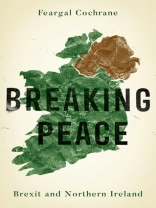In 2021, Northern Ireland will commemorate its centenary, but Brexit, more than any other event in that 100-year history, has jeopardised its very existence. Events since 2016 have complicated political relationships within Northern Ireland and further destabilised the devolved institutions established in the wake of the 1998 Good Friday Agreement.
Feargal Cochrane’s urgent analysis argues that Brexit is breaking peace in Northern Ireland, making it the most significant event since Partition. Endless negotiations and uncertainty have brought contested identities back to the forefront of political debate. Always so much more than a line on a map, the border has become an existential marker of identity as well as a reminder of the dark days of violent conflict.
This insightful book explores how and why the Brexit negotiations have been so destabilising for politics in Northern Ireland, opening the door to a violent past.
Inhoudsopgave
Introduction
1 Brexit and Northern Ireland: hardening positions during the referendum
2 Brexit as meteor theory: external shocks to peace settlements
3 Brexit day: the result and the fallout
4 The election that changed the course of Brexit: Westminster 2017
5 Aspiration or guarantee? The ‘frictionless’ border
6 Brexit and the Good Friday Agreement
7 From partners to rivals: Anglo-Irish relations after Brexit
Epilogue: Brexit – do or die?
Index
Over de auteur
Feargal Cochrane was Professor of International Conflict Analysis at the University of Kent and Director of the Conflict Analysis Research Centre (CARC) within the School of Politics and International Relations from 2012-19. He is now a Senior Research Fellow of CARC and Emeritus Professor.












